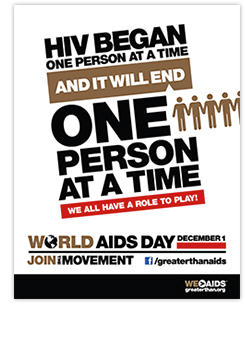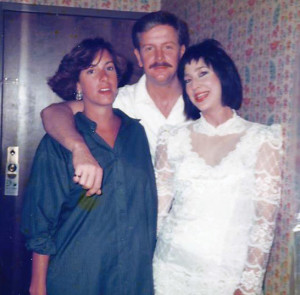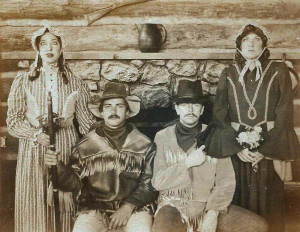 Because it’s World AIDS Day, I recall an old friend who’s no longer with me especially today, every year since 1987.
Because it’s World AIDS Day, I recall an old friend who’s no longer with me especially today, every year since 1987.
Meet Tony M, a dear friend who succumbed to AIDS in 1987 in the first generation of white gay men who braved the Ronald Reagan Era of the band playing on when this new disease ravaged a significant slice of a generation of creative, energetic, young people.
Here are two pictures of Tony with me and friends: the first, of Tony in between my friend Susan and me, at my wedding; the second, Tony with his friend and my cousin-friend, having a blast at Cedar Point donning wild west costumes and mugging for the camera in a faux daguerreotype picture.
 Tony was diagnosed with Kaposi’s Sarcoma in 1986, just after the first photo was taken. There was no talking of HIV at that point in viral history: you were diagnosed, cared for with Kaposi’s Sarcoma and opportunistic infections that plagued you until you died.
Tony was diagnosed with Kaposi’s Sarcoma in 1986, just after the first photo was taken. There was no talking of HIV at that point in viral history: you were diagnosed, cared for with Kaposi’s Sarcoma and opportunistic infections that plagued you until you died.
There were emerging therapeutic protocols that were getting filtered into the community, and clinical trials for the new drug AZT going on that year.
But as TIME magazine reported the year Tony was diagnosed, “The name of the virus had itself become a political football as the French insisted on LAV (lymphadenopathy-associated virus), while Gallo’s group used HTLV-3 (human T-cell lymphotropic virus, type 3).”
 Health Populi’s Hot Points: I saw the movie Philomena over the weekend, which touched me especially as I knew I was heading into the week ushering in World AIDS Day. [SPOILER ALERT!- skip the next paragraph if you don’t want to know what happens in the film.]
Health Populi’s Hot Points: I saw the movie Philomena over the weekend, which touched me especially as I knew I was heading into the week ushering in World AIDS Day. [SPOILER ALERT!- skip the next paragraph if you don’t want to know what happens in the film.]
Philomena Lee was a young teen mother who was forced to give up her baby boy in 1955 Ireland, her own father dropping her off to the Catholic Roscrea Abbey into the “care” of the Sisters of the Sacred Heart. Philomena birthed her son there in the Abbey, and then spent several years toiling in the Magdalene Laundry in abusive working conditions. When Philomena’s son was four months old, an American family adopted him, flying him to the U.S. and raising him up to become a successful lawyer who worked with both the (ironically) Reagan and Bush administrations.
Ironic, because Michael died of AIDS.
At my local cineplex this week is another film where AIDS plays a central role: The Dallas Buyers Club. In that film, a man newly diagnosed with HIV in 1985 gets frustrated with the lack of available treatments for HIV/AIDS in his Texas community, so takes on the role of a group purchasing organization to help channel medicines to people who need them.
These two films remind us that, in many ways, HIV/AIDS was quite a different diagnosis and medical experience in the 1980s and early 1990s.
Yet here we are without a cure, 30+ years after Patient Zero boarded that plane from Africa to North America, one node in a growing network of people infected with the AIDS virus described in Randy Shilts’ still-crucial-to-read-book, And the Band Played On.
It drives me mad, three decades later, that in the U.S. we are still looking at too many diseases through a political lens, playing politics with science funding and service provision to some of the most vulnerable people on the planet.
See the tagline on a World AIDS Day poster, above: HIV began one person at a time, and it will end one person at a time. We all have a role to play. I miss my friend very, very much. Whenever I have the opportunity to talk about HIV/AIDS prevention, increasing funding for research, and enlarging prescription drug assistance programs for People With AIDS, I speak up. I also spread the word about helpful tools and service to keep us safe and healthy when it comes to preventing the spread of STDs, and expand access to treatments, like:
- The Hula app that helps you find quality local places to get tested and enables you to share that test result with partners
- The New York City condom finder app
- Prescription drug access programs for HIV treatments.
HIV will indeed end, one person at a time. Play your role.




 Thanks to Feedspot for naming this blog, Health Populi, as a
Thanks to Feedspot for naming this blog, Health Populi, as a